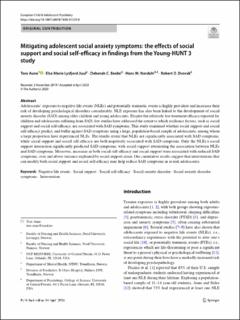| dc.contributor.author | Aune, Tore | |
| dc.contributor.author | Juul, Else Marie Lysfjord | |
| dc.contributor.author | Beidel, Deborah C. | |
| dc.contributor.author | Nordahl, Hans Morten | |
| dc.contributor.author | Dvorak, Robert D. | |
| dc.date.accessioned | 2021-03-05T09:27:55Z | |
| dc.date.available | 2021-03-05T09:27:55Z | |
| dc.date.created | 2021-01-06T12:56:01Z | |
| dc.date.issued | 2020 | |
| dc.identifier.citation | Aune, T., Juul, E. M. L., Beidel, D. C., Nordahl, H. M. & Dvorak, R. D. (2020). Mitigating adolescent social anxiety symptoms: The effects of social support and social self-efficacy in findings from the Young-HUNT 3 Study. European Child & Adolescent Psychiatry. doi: | en_US |
| dc.identifier.issn | 1018-8827 | |
| dc.identifier.uri | https://hdl.handle.net/11250/2731783 | |
| dc.description.abstract | Adolescents’ exposure to negative life events (NLEs) and potentially traumatic events is highly prevalent and increases their risk of developing psychological disorders considerably. NLE exposure has also been linked to the development of social anxiety disorder (SAD) among older children and young adolescents. Despite the relatively low treatment efficacy reported for children and adolescents suffering from SAD, few studies have addressed the extent to which resilience factors, such as social support and social self-efficacy, are associated with SAD symptoms. This study examined whether social support and social self-efficacy predict, and buffer against SAD symptoms using a large, population-based sample of adolescents, among whom a large proportion have experienced NLEs. The results reveal that NLEs are significantly associated with SAD symptoms, while social support and social self-efficacy are both negatively associated with SAD symptoms. Only the NLEs × social support interaction significantly predicted SAD symptoms, with social support attenuating the association between NLEs and SAD symptoms. Moreover, increases in both social self-efficacy and social support were associated with reduced SAD symptoms, over and above variance explained by social support alone. Our cumulative results suggest that interventions that can modify both social support and social self-efficacy may help reduce SAD symptoms in at-risk adolescents. | en_US |
| dc.language.iso | eng | en_US |
| dc.publisher | Springer | en_US |
| dc.rights | Navngivelse 4.0 Internasjonal | * |
| dc.rights.uri | http://creativecommons.org/licenses/by/4.0/deed.no | * |
| dc.title | Mitigating adolescent social anxiety symptoms : the effects of social support and social self-efficacy in findings from the Young-HUNT 3 study | en_US |
| dc.type | Peer reviewed | en_US |
| dc.type | Journal article | en_US |
| dc.description.version | publishedVersion | en_US |
| dc.rights.holder | © 2020 The Author(s) | en_US |
| dc.subject.nsi | VDP::Medisinske Fag: 700 | en_US |
| dc.subject.nsi | VDP::Medisinske Fag: 700::Klinisk medisinske fag: 750::Psykiatri, barnepsykiatri: 757 | en_US |
| dc.source.pagenumber | 9 | en_US |
| dc.source.journal | European Child and Adolescent Psychiatry | en_US |
| dc.identifier.doi | 10.1007/s00787-020-01529-0 | |
| dc.identifier.cristin | 1866299 | |
| dc.description.localcode | Unit Licence Agreement | en_US |

